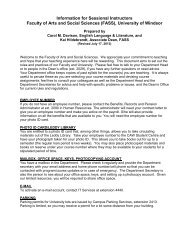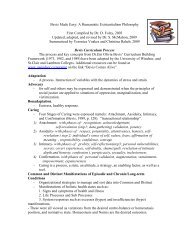No Exit: Racial Profiling and The War Against Terrorism
No Exit: Racial Profiling and The War Against Terrorism
No Exit: Racial Profiling and The War Against Terrorism
Create successful ePaper yourself
Turn your PDF publications into a flip-book with our unique Google optimized e-Paper software.
41 OSGHLJ 293 Page 2<br />
41 Osgoode Hall L.J. 293<br />
III. PROBLEMS WITH RACIAL PROFILING 304<br />
A. <strong>Racial</strong> <strong>Profiling</strong> <strong>and</strong> Pre-<br />
9/11 Images of Arabs <strong>and</strong><br />
Muslims<br />
B. <strong>Racial</strong> <strong>Profiling</strong> is Overinclusive<br />
or Generates False<br />
Positives<br />
C. <strong>Racial</strong> <strong>Profiling</strong> Is Underinclusive<br />
or Generates<br />
False Negatives<br />
IV. RACIAL PROFILING AND RACISM 314<br />
V. CONCLUSION 317<br />
*294 I. INTRODUCTION<br />
<strong>No</strong> <strong>Exit</strong>, Jean-PaulSartre'scelebratedplay,examinesthemeaning<strong>and</strong>significanceoftheselfasdefinedthroughthe<br />
gaze of the other. Sartre's characters, three souls damned to Hell, constantly look for mirrors to avoid each other's interrogating<br />
gaze as they await the arrival of their torturer. <strong>The</strong> lack of mirrors in the room <strong>and</strong> the constant stare of the<br />
play's audience underline the futility of the characters' quest to be seen exclusively through their own eyes. As they await<br />
their fate in Hell, Sartre's characters try to guess what their torturer will look like. Suddenly, the revelation dawns; they<br />
are each other's torturers. [FN1]<br />
Torturers, tormentors, <strong>and</strong> terrorists can sometimes take surprising forms. Following the attacks on the World Trade<br />
Center <strong>and</strong> the Pentagon, <strong>and</strong> the downing of United Flight 93 in Pennsylvania on September 11, 2001 (9/11), some<br />
scholars <strong>and</strong> policy makers, suggesting that they knew what a terrorist looked like, advocated for the racial profiling of<br />
Arabs <strong>and</strong> Muslims as the means towards greater national security. While racial profiling has not been officially sanctioned<br />
in Canada, it still attracts popular support <strong>and</strong> undeniably takes place. Like Sartre's three souls, at least some Canadians<br />
believe that we will know our tormentors when we see them. Yet, racial profiling does not expose potential terrorists<br />
<strong>and</strong> fails to increase national security. On the contrary, it undermines national security while harming Arabs,<br />
Muslims, <strong>and</strong> other racialized groups by heightening their vulnerability <strong>and</strong> reinforcing their exclusion from Canadian<br />
society. <strong>Racial</strong> profiling acts as our mirror—it reflects an increasingly racialized society that, like Sartre's characters,<br />
tries desperately to avoid seeing itself through the gaze of its excluded others.<br />
© 2010 Thomson Reuters. <strong>No</strong> Claim to Orig. US Gov. Works.<br />
304<br />
309<br />
313





